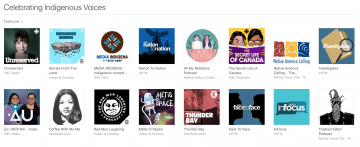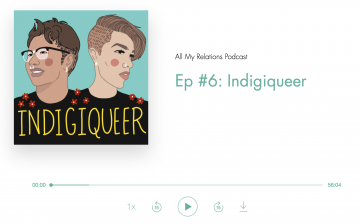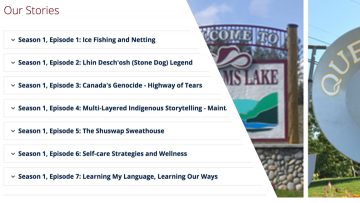Since the colonization of Turtle Island, Indigenous peoples were treated as if the lack of written documentation – in favour of oral storytelling – nullified their knowledge and worldviews. The oral methods Indigenous peoples used to record stories and pass down knowledge through generations faced erasure by assimilation policies that sought to indoctrinate Indigenous children and made them be ashamed of their traditions and culture. For Indigenous peoples to govern themselves they have to govern their stories and the ways of telling those stories. With the rise of technology, digital media has become a medium that allows a world of possibilities, including the creation and dissemination of Indigenous stories through podcasting. Podcasts developed and hosted by Indigenous people aim to reclaim oral tradition and celebrate stories told from an Indigenous perspective.

Podcasting allows Indigenous stories to be broadcasted across the world in a way that gives Indigenous peoples more agency, flexibility, and creative liberties, consequently challenging colonial legacies, and the stereotypical representations that exist within it. Driven by the desire of Indigenous peoples to assume agency over their representation, Indigenous podcasts have emerged as a tool to decolonize the airwaves. New journeys created a list of 11 Indigenous podcasts for your listening pleasure, the list covers a wide range of Indigenous podcasters putting out ground-breaking content for your heart and soul. The list features one of my favourite podcasts: The Henceforward which is a podcast that started as part of a graduate course called Decolonization, Settler Colonialism and Antiblackness taught by Dr. Eve Tuck at OISE. The Henceforward considers relationships between Indigenous Peoples and Black Peoples on Turtle Island. Be sure to subscribe!
Digital storytelling can support us to strengthen and enrich our cultural communities. Through the rising trend of Indigenous podcasting, Indigenous peoples have the power to expand the limits of technology and shape the way they tell stories. The intersection of digital media, podcasting, and Indigenous storytelling, has made content to be as numerous and varied as the Indigenous communities represented. From issues of representation in mainstream media with All My Relations to creating space for Indigenous resurgence by disrupting colonial systems with 2 Crees in a Pod, you can find Indigenous podcasts about everything. My all-time favourite episodes was a feature of botanist and member of the Citizen Potawatomi Nation, Robin Wall Kimmerer on On Being with Krista Tippett talking about The Intelligence of Plants and Episode 6 of the All My Relations Podcast called Indigiqueer which joined forces with two amazing Indigenous queer writers, Joshua Whitehead and Billy-Ray Belcourt.
3 Hidden Gems:
Red Man Laughing is hosted, created and produced by Anishinaabe comedian Ryan McMahon. Ryan’s storytelling comedy style is fast-paced, loose & irreverent. In an episode from season 3 of the Red Man Laughing podcast, Ryan McMahon takes you into the world of podcasting with a “How To Podcast” adventure. As he gets asked all the time about how someone can get started podcasting and the answer is quite simple – start recording yourself. then listen to this podcast episode and learn the ins and outs. This episode of the podcast covers the basics of “How To Podcast” by focusing on 5 essential elements:
- The w 5 – who, what, where, when, why, how.
- Equipment/gear
- Website & Publishing
- RSS feeds & Subscribers
- Creating the show – formats, lengths & more
The essential how-to podcast is this: plan to record something, record something, publish what you’ve recorded with a podcast host (with an RSS feed), post what you’ve recorded on a website or websites, promote & cross-promote what you’ve recorded on social media, blogs, websites & email newsletters and repeat.
Through the Grease Trail Digital Storytelling project, Indigenous Teacher Candidates enrolled in NITEP’s Cariboo Field Centre created, developed and published a series of podcasts that are being featured on NITEP’s website. They consider the importance of Indigenous storytelling and explored land-based teaching strategies for creating digital storytelling resources. The Grease Trail Digital Storytelling project is a land-based experiential learning opportunity for Indigenous pre-service teachers in rural communities of north-central BC, to engage in traditional Indigenous storytelling practices in digital teaching and learning contexts. Go to the Grease Trail Digital Storytelling website and take a moment to listen to seven podcasts, ranging from 6 to 18 minutes in duration and produced on unceded territories of Tŝilhqot’in, Dakelh, and Secwépemc First Nations.


